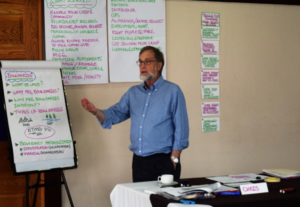
Land conflicts arise when individuals and communities compete for land use and ownership. This has been the case in many parts of Liberia, with some disputes resulting in loss of lives, destruction of propoerties, and other grave impacts on the socio-economic well-being of Liberians. Boundary harmonization and effective negotiation is a sustainable tool in helping to resolve existing and potential conflicts.
The USAID-funded Land Governance Support Activity (LGSA) conducted a five day intensive training for community workers on boundary harmonization in Liberia organized by LGSA partners Parley and facilitated by Dr. Christopher Moore of Collaborative Decision Resources Associates (CDR). The training focused on effective negotiation procedures to delimit, demarcate, and resolve disputes over boundaries in local communities. Participants were drawn from local NGOs and the Land Coordination Centers of the Interim Land Taskforce. They were trained in harmonization procedures and participated in a Training of Trainers session in order to provide for effective dissemination of the information and skills.
The training utilized a case study of two hypothetical communities and their perceptions of the location of their community’s boundary relative to various potential boundary issues (community forests, enclave settlements, mineral deposits, concessions, urbanization). Each community drew their boundaries (independent of the other community) and then the maps were overlaid to identify areas of potential competing claims. The communities were then given strategies to use in negotiating their respective claims.
Critical to the negotiation of boundaries is the establishment of a negotiation team within the community, which clearly understands the community’s objectives. The team must be representative of the community and have established relationships with the community members. Negotiators are obliged to maintain neutrality and allow the parties involved to come to their own decisions during the process.
The boundary harmonization training is a first step in preparing community workers to help communities in the process of identifying their boundaries. As customary land rights is a major theme in the proposed Land Rights Law, the law will give communities the right to own, manage, and transfer their land through their land management committees. The ability to identify and negotiate boundaries will be central to communities effectively managing their lands and asserting their rights.

